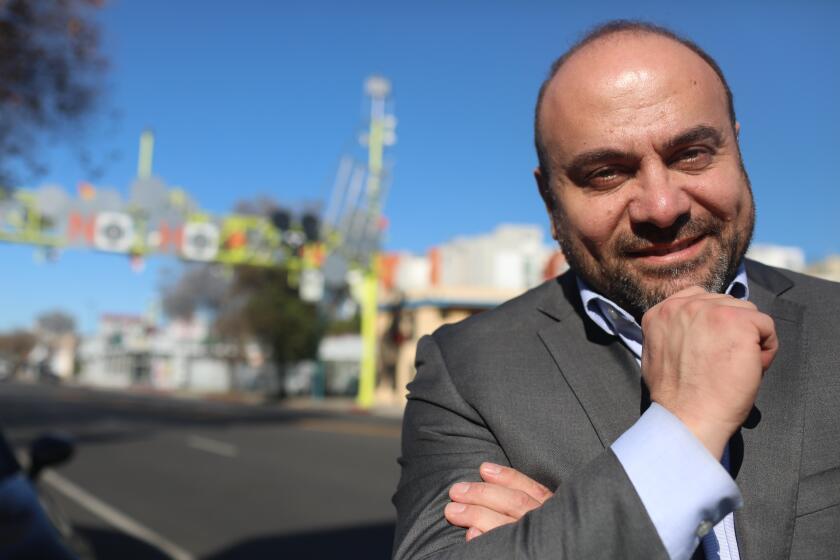From the Archives: Make Chris Take His ‘Meds’
Editor’s note: This piece was the second in The Times’ 10-part series on homelessness that won the 2002 Pulitzer Prize for editorial writing.
Read the full series here.
On any given day, about 50,000 severely mentally ill homeless people roam California’s streets, rummaging through trash bins, doing battle with invisible demons and occasionally inflicting harm on very real citizens. They do so largely because laws crafted decades ago put their “civil right” to be free ahead of society’s right to compel them to be treated.
These well-intentioned laws made some sense when they were passed, in the 1960s. Then, the awful side effects of some psychiatric medications turned patients into virtual zombies, blurring their vision, stiffening their muscles and dulling their memories. Better medications are available today; as a result, lawmakers will have a chance soon to make California safer and saner.
In and Out of Jail
Who are the new proposals aimed at? Meet 22-year-old Chris Hagar, who is now locked up in the Sacramento Mental Health Treatment Center. Since age 15 Hagar has cycled in and out of six jails and mental hospitals, tormented by paranoid schizophrenia. He’d steal food from mom-and-pop grocery stores and promptly get arrested. He’d assault his parents and others. He’d break into a car to escape shadowy stalkers.
Before the onset of his illness, Hagar was a smart kid with a keen sense of humor who excelled at life. When he was 12, he joined the San Francisco Boys Chorus and was quickly promoted to master singer because of his perfect pitch and musical memory. He toured Europe and won second place in an international competition against dozens of other nations; he ran a business airbrushing fine art on T-shirts.
At 15, his illness was diagnosed as schizophrenia with psychotic symptoms and agitated depression, but his dreams never died. Just last week he told his father how much he wants to work again.
The problem is that when he is not compelled to take his medicine, he doesn’t. When he doesn’t take his “meds,” he gets wildly aggressive. Seventeen times Hagar has attacked his family. He once bashed his father with a chair at the suggestion that soldiers weren’t really hunting him down. Two months ago, at a treatment center, he kicked a fellow patient in the face. He was expelled and spent a week in the Sacramento County jail.
Three Problems
Hagar and thousands like him are falling through California’s increasingly tattered safety net because of critical flaws in the system. To start mending it, Assemblywoman Helen Thomson (D-Davis) has introduced three good bills, all of which will come up for crucial votes in the Assembly in the next two weeks. Each addresses a specific problem:
* Because Hagar is now on medication, he shows no imminent danger to himself or others and thus can’t be monitored against his will or detained. Soon, a judge must release him. At best, the court will be able to supply him with the address of a good mental health clinic, which he’s unlikely to use.
Thomson’s first bill, AB 1421, would allow judges to compel Hagar to accept follow-up care and outpatient treatment and would provide for social workers and psychiatrists to administer it. Such treatment could be compelled only after judges, mental health professionals and family members decided that without it, a severely mentally ill person would be at “high risk” of injury to self or others.
* Often when Hagar gets out, he high-tails it to counties far from home. Judges and mental health workers there have no history on him. They don’t know crucial details about the medication regimen that brings him back to reality: that one antipsychotic medication, risperidone, doesn’t help him at all but another, olanzapine, does.
Thomson’s AB 1424 would get at this problem by requiring courts to consider psychiatric histories when sentencing and would computerize and streamline an existing database of mentally ill people in the state who had been arrested for violent crimes. The database would replace the state’s woefully ineffective, mostly paper-based mental health information system, rightly derided as the MISS system because it misses so much.
* Counties often fail to care for Hagar and others like him because their mental health, law enforcement and judicial systems are ineffective. Thomson’s third bill, AB 1422, would bring business leaders together with doctors, law enforcement, psychiatrists, homeless advocates, and others in a new mental health commission. By reaching beyond the usual bureaucracies, this approach could better succeed in identifying the most cost-effective treatments for people like Chris Hagar.
Regaining a Balance
Economic considerations are important because Sacramento now spends $2 billion a year on mental health services without requiring counties to show they are using it prudently. AB 1422 would require state Mental Health Director Stephen Mayberg to come up with “best practices” and accountability measures. Taxpayers would have a much better idea whether the money is being used wisely.
It is a symptom of this nation’s goodness that it protects the rights and liberties of the mentally ill. In this noble pursuit, we have granted some genuinely helpless individuals the liberty to harm themselves, and others, in never-ending cycles. Free people should always hesitate to diminish anyone’s civil liberties, but in this instance there’s good reason.
Chris’ parents love him. That is why they take no joy in knowing that a Sacramento County judge is likely to release him any day now. They know it will be only months at best before Chris goes off medication and breaks the law again.
What will it be this time? Stealing beer and chips from a convenience store? Something more serious? As always, his parents pray no one is hurt.
There’s not much more they can do--until our legislators approve these firm but ultimately compassionate measures.
Follow the Opinion section on Twitter @latimesopinionand Facebook
More to Read
A cure for the common opinion
Get thought-provoking perspectives with our weekly newsletter.
You may occasionally receive promotional content from the Los Angeles Times.










